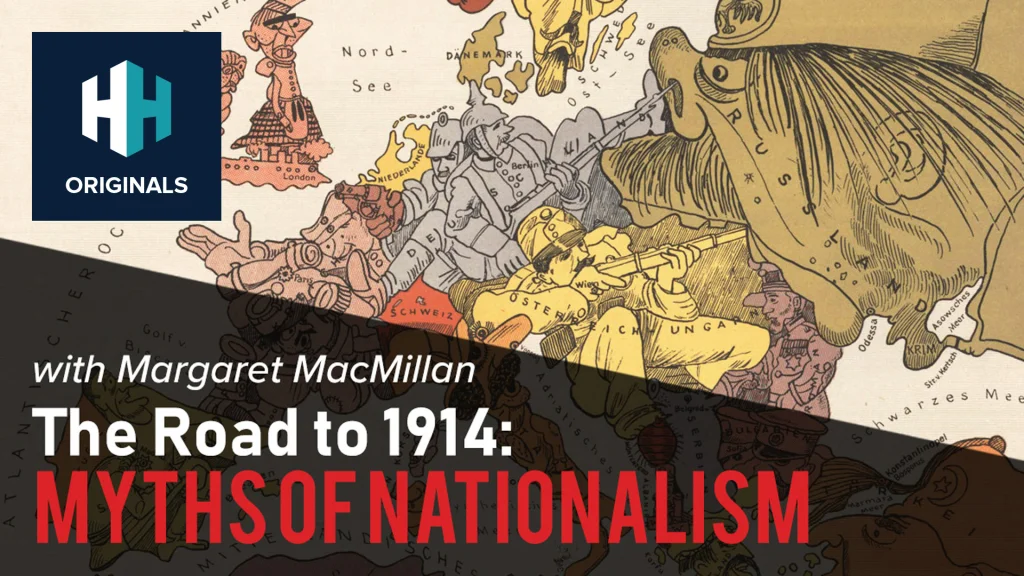[adthrive-in-post-video-player video-id=”WYPChDEb” upload-date=”2022-06-16T16:09:12.000Z” name=”The 4 M-A-I-N Causes of World War One” description=”” player-type=”default” override-embed=”default”]
It’s possibly the single most pondered question in history – what caused World War One? It wasn’t, like in World War Two, a case of a single belligerent pushing others to take a military stand. It didn’t have the moral vindication of resisting a tyrant.
Rather, a delicate but toxic balance of structural forces created a dry tinder that was lit by the assassination of Archduke Franz Ferdinand in Sarajevo. That event precipitated the July Crisis, which saw the major European powers hurtle toward open conflict.
M-A-I-N
The M-A-I-N acronym – militarism, alliances, imperialism and nationalism – is often used to analyse the war, and each of these reasons are cited to be the 4 main causes of World War One. It’s simplistic but provides a useful framework.
Militarism
The late nineteenth century was an era of military competition, particularly between the major European powers. The policy of building a stronger military was judged relative to neighbours, creating a culture of paranoia that heightened the search for alliances. It was fed by the cultural belief that war is good for nations.
Germany in particular looked to expand its navy. However, the ‘naval race’ was never a real contest – the British always s maintained naval superiority. But the British obsession with naval dominance was strong. Government rhetoric exaggerated military expansionism. A simple naivety in the potential scale and bloodshed of a European war prevented several governments from checking their aggression.
 Listen Now
Listen NowAlliances
A web of alliances developed in Europe between 1870 and 1914, effectively creating two camps bound by commitments to maintain sovereignty or intervene militarily – the Triple Entente and the Triple Alliance.
- The Triple Alliance of 1882 linked Germany, Austria-Hungary and Italy.
- The Triple Entente of 1907 linked France, Britain and Russia.
A historic point of conflict between Austria Hungary and Russia was over their incompatible Balkan interests, and France had a deep suspicion of Germany rooted in their defeat in the 1870 war.
The alliance system primarily came about because after 1870 Germany, under Bismarck, set a precedent by playing its neighbours’ imperial endeavours off one another, in order to maintain a balance of power within Europe

‘Hark! hark! the dogs do bark!’, satirical map of Europe. 1914
Image Credit: Paul K, CC BY 2.0
Imperialism
Imperial competition also pushed the countries towards adopting alliances. Colonies were units of exchange that could be bargained without significantly affecting the metro-pole. They also brought nations who would otherwise not interact into conflict and agreement. For example, the Russo-Japanese War (1905) over aspirations in China, helped bring the Triple Entente into being.
It has been suggested that Germany was motivated by imperial ambitions to invade Belgium and France. Certainly the expansion of the British and French empires, fired by the rise of industrialism and the pursuit of new markets, caused some resentment in Germany, and the pursuit of a short, aborted imperial policy in the late nineteenth century.
However the suggestion that Germany wanted to create a European empire in 1914 is not supported by the pre-war rhetoric and strategy.
Nationalism
Nationalism was also a new and powerful source of tension in Europe. It was tied to militarism, and clashed with the interests of the imperial powers in Europe. Nationalism created new areas of interest over which nations could compete.
 Watch Now
Watch NowFor example, The Habsburg empire was tottering agglomeration of 11 different nationalities, with large slavic populations in Galicia and the Balkans whose nationalist aspirations ran counter to imperial cohesion. Nationalism in the Balkan’s also piqued Russia’s historic interest in the region.
Indeed, Serbian nationalism created the trigger cause of the conflict – the assassination of the heir to the Austro-Hungarian throne, Archduke Franz Ferdinand.
The spark: the assassination
Ferdinand and his wife were murdered in Sarajevo by Gavrilo Princip, a member of the Bosnian Serbian nationalist terrorist organization the ‘Black Hand Gang.’ Ferdinand’s death, which was interpreted as a product of official Serbian policy, created the July Crisis – a month of diplomatic and governmental miscalculations that saw a domino effect of war declarations initiated.
The historical dialogue on this issue is vast and distorted by substantial biases. Vague and undefined schemes of reckless expansion were imputed to the German leadership in the immediate aftermath of the war with the ‘war-guilt’ clause. The notion that Germany was bursting with newfound strength, proud of her abilities and eager to showcase them, was overplayed.

The first page of the edition of the ‘Domenica del Corriere’, an Italian paper, with a drawing by Achille Beltrame depicting Gavrilo Princip killing Archduke Franz Ferdinand of Austria in Sarajevo
Image Credit: Achille Beltrame, Public domain, via Wikimedia Commons
The almost laughable rationalization of British imperial power as ‘necessary’ or ‘civilizing’ didn’t translate to German imperialism, which was ‘aggressive’ and ‘expansionist.’ There is an on-going historical discussion on who if anyone was most culpable.
Blame has been directed at every single combatant at one point or another, and some have said that all the major governments considered a golden opportunity for increasing popularity at home.
The Schlieffen plan could be blamed for bringing Britain into the war, the scale of the war could be blamed on Russia as the first big country to mobilise, inherent rivalries between imperialism and capitalism could be blamed for polarising the combatants. AJP Taylor’s ‘timetable theory’ emphasises the delicate, highly complex plans involved in mobilization which prompted ostensibly aggressive military preparations.
Every point has some merit, but in the end what proved most devastating was the combination of an alliance network with the widespread, misguided belief that war is good for nations, and that the best way to fight a modern war was to attack. That the war was inevitable is questionable, but certainly the notion of glorious war, of war as a good for nation-building, was strong pre-1914. By the end of the war, it was dead.













